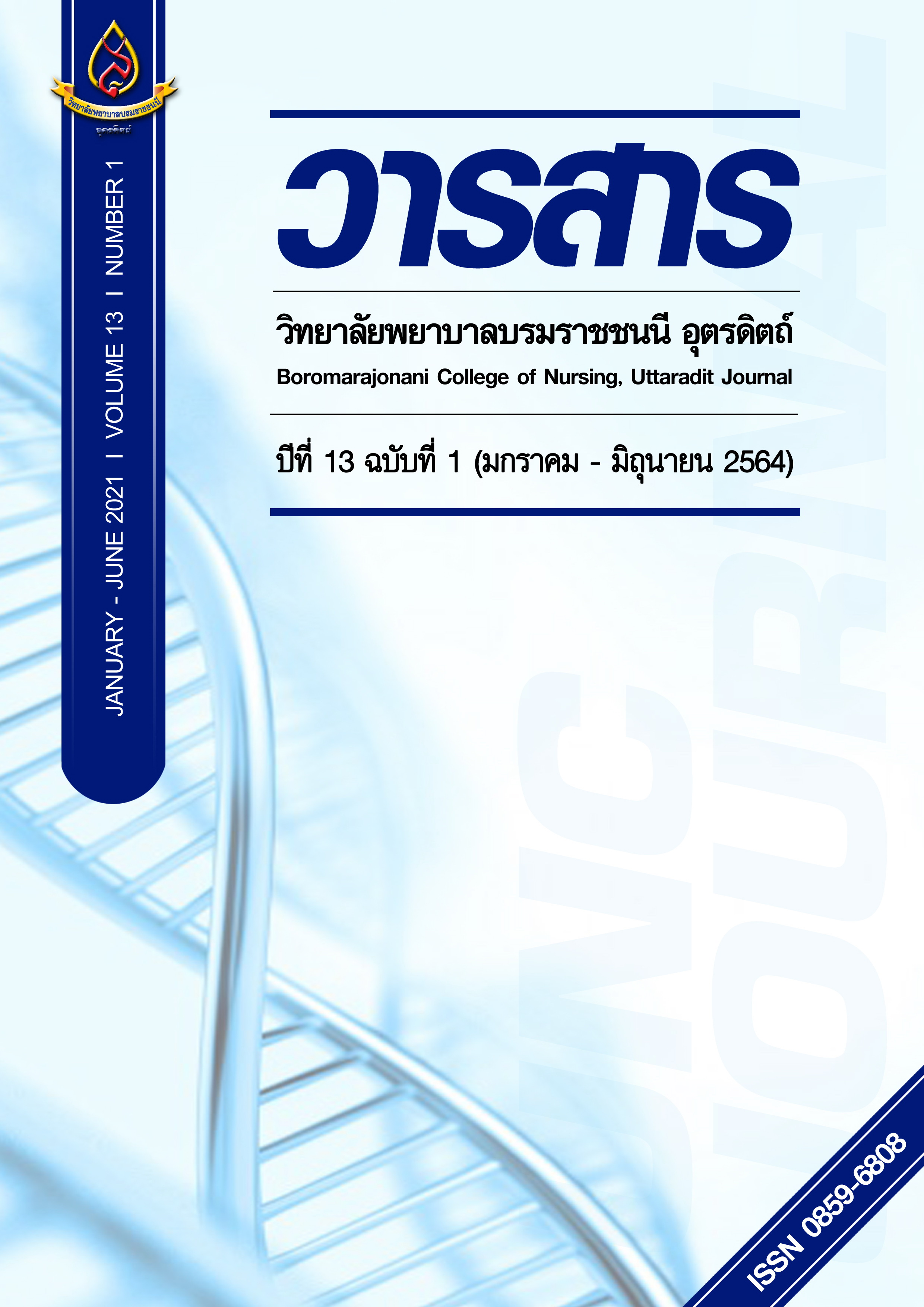ความเครียด ความกลัวการคลอดบุตรและกลุ่มอาการแพ้ท้องในผู้จะเป็นบิดาครั้งแรก
Main Article Content
บทคัดย่อ
การวิจัยเชิงพรรณนาหาความสัมพันธ์มีวัตถุประสงค์เพื่อศึกษากลุ่มอาการแพ้ท้องในผู้จะเป็นบิดา และความสัมพันธ์ระหว่างความเครียด ความกลัวการคลอดบุตรกับกลุ่มอาการแพ้ท้องในผู้จะเป็นบิดาครั้งแรก เลือกกลุ่มตัวอย่างตามคุณสมบัติที่กำหนดไว้ จำนวน 85 ราย กลุ่มตัวอย่างคือ ชายที่จะเป็นบิดาครั้งแรกที่พาภรรยามารับบริการที่แผนกฝากครรภ์ ของโรงพยาบาลมหาราชนครเชียงใหม่ และโรงพยาบาลส่งเสริมสุขภาพ ศูนย์อนามัยที่ 1 เชียงใหม่ เครื่องมือที่ใช้ในการรวบรวมข้อมูล คือ แบบสอบถามข้อมูลส่วนบุคคล แบบสอบถามกลุ่มอาการแพ้ท้องในผู้จะเป็นบิดา แบบวัดความเครียดของสวนปรุง แบบสอบถามความกลัวการคลอดบุตรของผู้จะเป็นบิดา วิเคราะห์ข้อมูลโดยใช้สถิติพรรณนาและสถิติสัมประสิทธิ์สหสัมพันธ์แบบเพียร์สัน
ผลการศึกษา พบว่า กลุ่มตัวอย่างส่วนใหญ่ ร้อยละ 90.60 มีอาการแพ้ท้องอยู่ในระดับต่ำและมีคะแนนเฉลี่ยอาการแพ้ท้อง เท่ากับ 34.98 (SD = 24.35) มีกลุ่มอาการแพ้ท้องตั้งแต่ 1 อาการจนถึง 49 อาการ โดยกลุ่มอาการด้านร่างกายพบมากที่สุด ได้แก่ อยากอาหารเพิ่มขึ้น มีน้ำหนักตัวเพิ่มขึ้น รู้สึกหิวบ่อย รู้สึกปวดหลัง รู้สึกอ่อนเพลีย คิดเป็นร้อยละ 68.23, 64.70, 63.53, 56.47 และ 54.12 ตามลำดับ กลุ่มอาการด้านจิตใจที่พบมากที่สุด ได้แก่ มีความสุขมากขึ้น ตื่นเช้ากว่าปกติ นอนหลับน้อยกว่าปกติ นอนหลับมากกว่าปกติ และรู้สึกหงุดหงิด คิดเป็นร้อยละ 90.59, 56.46, 51.76, 50.59 และ 49.41 ตามลำดับ ความเครียดมีความสัมพันธ์ทางบวกกับกลุ่มอาการแพ้ท้องในผู้จะเป็นบิดา อย่างมีนัยสำคัญทางสถิติที่ระดับ .01 (r = .61, p<.01) ความกลัวการคลอดบุตร มีความสัมพันธ์ทางบวกกับกลุ่มอาการแพ้ท้องในผู้จะเป็นบิดา อย่างมีนัยสำคัญทางสถิติที่ระดับ .01 (r = .39, p<.01) ผลการศึกษาเสนอแนะว่าสามารถใช้เป็นข้อมูลพื้นฐานสำหรับวางแผนการพยาบาลที่มีประสิทธิภาพในการปฏิบัติการพยาบาลเพื่อลดกลุ่มอาการแพ้ท้องในผู้จะเป็นบิดา
Article Details
บทความหรือข้อคิดเห็นใดใดที่ปรากฏในวารสารวิจัยการพยาบาลและวิทยาศาสตร์สุขภาพ เป็นวรรณกรรมของผู้เขียน ซึ่งบรรณาธิการหรือสมาคมศิษย์เก่า ไม่จำเป็นต้องเห็นด้วย และบทความที่ได้รับการตีพิมพ์เผยแพร่ถือเป็นลิขสิทธิ์ของวารสารวิจัยการพยาบาลและวิทยาศาสตร์สุขภาพ
เอกสารอ้างอิง
Bartlett, E. E. (2004). The effect of fatherhood on the health of men: A review of the literature. Journal of Men’s Health and Gender, 1, 159-169.
Bogren, L. Y. (1984). The couvade syndrome: Background variables. Acta Psychiatrica Scandinavia, 70, 316-320.
Brennan, A. (2010). Couvade syndrome in Australian men: a national survey. Our national couvade survey – Full report article. Kingston University, St. George’s & University of London, London.
Brennan, A., Marshall-Lucette, S., Ayers, S., & Ahmed, H. (2007). A qualitative exploration of the couvade syndrome in expectant fathers. Journal of Reproductive and Infant Psychology, 25(1), 18-39.
Clinton, J. F. (1986). Expectant fathers at risk of couvade. Nursing Research, 30, 281-284.
Clinton, J. F. (1987) Physical and emotional responses of expectant fathers throughout pregnancy and the early postpartum period. International Journal of Nursing Studies, 24(1), 59-68.
Deave, T., Johnson, D., & Ingram, J. (2008). Transition to parenthood: The needs of parents in pregnancy and early parenthood. Biomedcentral Pregnancy and Childbirth, 8(30), 1-11.
Dickens, G., & Trethowan, W. A. (1971). Cravings and aversions during pregnancy. Journal of Psychosomatic Research, 15, 259-268.
Eriksson, C., Westman, G., & Hamberg, K. (2005). Experiential factors associated with childbirth-related fear in Swedish women and men: A population based study. Journal of Psychosomatic Obstetrics and Gynaecology, 26(1), 63-72.
Ganapathy, T. (2014). Couvade syndrome among 1st time expectant fathers. Muller Journal
of Medical Science and Research, 5(1), 43–47.
Kazmierczak, M., Kielbratowska, B., Pastwa-Wojciechowska, B., & Preis, K. (2013). Couvade syndrome among Polish expectant fathers. Medical Science Monitor, 19, 132-138.
Khanobdee, C., Sukratanachaiyakul, V., & Templeton, G. J. (1993). Couvade syndrome in expectant Thai fathers. International Journal of Nursing Studies, 30(2), 125-131.
Laplante, P. (1991). The Couvade Syndrome: The biological, psychological, and social
impact of pregnancy on the expectant father. Canadian Family Physician, 37, 1633– 1660.
Marsiglio, W., Amato, P., Day, R. D., & Lamb, M. E. (2000). Scholarship on fatherhood in the 1990s and beyond. Journal of Marriage and Family, 62, 1173-1191.
Masoni, S., Maio, A., Trimarchi, G., Punzio, C. D., & Fioretti, P. (1994). The couvade syndrome. Journal of Psychosomatic Obstetrics and Gynecology, 15, 125-131.
Maternal-Fetal Medicine Unit Department of Obstetrics and Gynecology Faculty of Medicine Chiang Mai University. (2018). Maternal-Fetal Medicine 2018. Chiang Mai: Faculty of Medicine Chiang Mai University. (in Thai).
Miller, L. H., Smith, A. D., & Rothstein, L. (1993). The stress solution: an action plan to manage the stress in your life. New York: Pocket Books.
Mrayan, L., Cornish, F., Dhungana, N., & Parfitt, B. (2016). Transition to parenthood during the transition to modernity in Jordan: New parents’ views on family and healthcare support systems. Applied Nursing Research, 32, 139–143.
Mrayan, L., Abujilban, S., Abuidhail, J., Yassein, M. B., & Al-Modallal, H. (2018). Couvade syndrome among Jordanian expectant fathers. American Journal of Men’s Health, 1-9. doi:10.1177/1557988318810243journals.sagepub.com/home/jmh
Polit, D. F., & Beck, C. T. (2017). Nursing research: Generating and assessing evidence for nursing practice (10th ed.). Philadelphia, PA: Wolters Kluwer.
Rucha, Y., Lertmaleewong, M., Laohachinda, Y., Leesuwan, W., Putwattana, P., & Thanurak, R. (1994). Nursing Research. Bangkok: Siamsilp Printing Company. (in Thai).
Sansiriphun, N. (2009). Becoming a first time father among Thais. Unpublished doctor dissertation, Chang Mai University, Chang Mai, Thailand.
Sansiriphun, N., Baosoung, C., Soivong, P., & Sangkhum, N. (2017). Development of paternal fear of childbirth scale. Nursing Journal, 44(2), 35-45. (in Thai).
Sansiriphun, N., Kantaruksa, K., Klunklin, A., Baosuang, C., & Jordan, P. (2010). Thai men becoming a first-father. Nursing & Health Sciences, 12(4), 403-409. doi:10.1111/j.1442-2018.2010.00549.x
Trethowan, W. H., & Conlon, M. F. (1965). The couvade syndrome. British Journal of Psychiatry, 111, 57-66.
Tsai, S., & Chen, C. (1997). Somatic symptoms, stress and social support of expectant fathers (Chinese). Nursing Research, 5(5), 439-451.
Wijma, K., Wijma, B., & Zar, M. (1998). Psychometric aspects of the W-DEQ: A new questionnaire for the measurement of fear of childbirth. Journal of Psychosomatic Obstetrics and Gynaecology, 19, 84-97.


